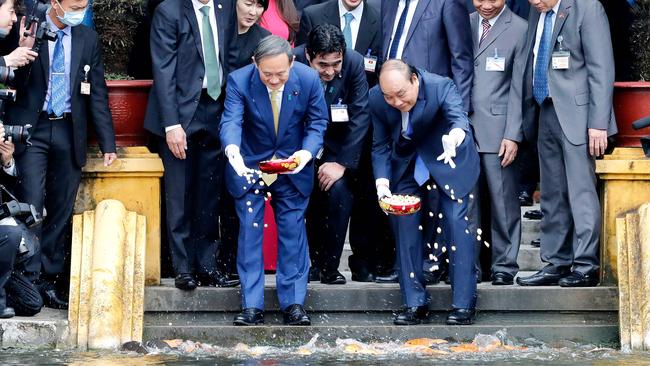Yoshihide Suga builds China wedge with Vietnam weapons deal
New Prime Minister Yoshihide Suga has signed a landmark deal to export Japanese military equipment to Vietnam.

Quadrilateral states Japan, Australia, the US and India are ramping up security and economic ties in the Indo-Pacific to counter China’s influence with a flurry of visits and fresh agreements, including a landmark deal to export Japanese military equipment to Vietnam.
Japan’s new Prime Minister Yoshihide Suga signed the preliminary deal in Hanoi with his Vietnamese counterpart Nguyen Xuan Phuc on Monday before heading to Indonesia to promote his government’s “free and open Indo-Pacific” vision for multilateral economic and security cooperation.
The decision to make the Southeast Asian nations his first overseas stop as Prime Minister reflects the new leader’s determination to continue the foreign policy emphasis of his predecessor, Shinzo Abe, who was an enthusiastic exponent of the Quadrilateral grouping as a democratic counterweight to China’s increasingly autocratic influence in the region.
The new pact could see Japan export patrol planes and radar equipment to Vietnam, a rival claimant along with Malaysia, Brunei, Taiwan and The Philippines to islands in the South China Sea that China has occupied and militarised in recent years.
Mr Suga described Vietnam as a “cornerstone” of efforts to realise a “free and open Indo-Pacific” and in a later speech criticised activities in the South China Sea “that go against the rule of law”, in a swipe at China’s military aggression in the strategic waterways.
“It is important that all nations involved work towards a peaceful resolution of conflict in the South China Sea without resorting to force or coercion,” he said.
Vietnam, a strident critic of Beijing’s claims to 90 per cent of the resource-rich South China Sea, has strengthened ties with all Quadrilateral member nations in recent years amid increasingly strained relations with Beijing.
Mr Suga also met with Indonesian President Joko Widodo late on Tuesday to discuss restarting travel between the two countries, investment in rail and port infrastructure and plans for a “two-plus-two” meeting between their respective foreign and defence ministers.
“To further advance security and defence cooperation between the two countries amid the changing regional situation, we’ve agreed to hold a meeting of foreign and defence ministers at an early date and to accelerate talks over the transfer of defence equipment and technology,” Mr Suga said at a joint press conference.
President Widodo said that a stronger partnership between Tokyo and Jakarta was critical, “especially during increasingly glaring rivalry between the world’s big powers”.
Last weekend, Indonesian Defence Minister Prabowo Subianto met with US Defence Secretary Mark Esper in Washington where the two agreed to boost defence co-operation and work together on maritime security. And India finally asked Australia to join its biennial Malabar military exercises with the US and Japan next month — a coveted invitation that is likely to further escalate tensions with Beijing.
That same day, Tokyo and Canberra announced they had struck a deal allowing Japan to protect Australian military assets in non-combat situations, and to broaden co-operation in the maritime arena.
“Australia is our special and strategic partner in the region. To maintain and enhance a free and open Indo-Pacific, we will increase our countries’ co-operation and interaction,” Japanese Defence Minister Nobuo Kishi said at a joint press appearance.
The initiatives come at a time of intense strategic rivalry between the US and China in the Indo-Pacific region, and as China has ramped up its carrot and stick approaches to regional neighbours.
China has been accused of taking advantage of the COVID-19 pandemic to ramp up its aggressive defence of its claim to the South China Sea through recent deployments of Chinese coastguards, fishing vessels and naval ships in Malaysian, Philippines, Indonesian and Taiwanese waters. Yet in recent weeks it has also mounted a charm offensive across Southeast Asia.
Last week, Chinese Foreign Minister Wang Yi toured ASEAN’s most Beijing-friendly nations — Cambodia, Laos, Malaysia and Thailand — bearing gifts and talking points that included hastening Asia’s economic recovery and concluding the South China Sea code of conduct.
Mr Wang signed a free-trade deal with Cambodia, promised to buy 1.7 million tonnes of Malaysian palm oil, pledged tariff waivers for goods shipped from Laos and preferential access to Chinese-developed coronavirus vaccines.
His promise to encourage Chinese technology investment in Thailand’s Eastern Economic Corridor was particularly well-timed as the military-backed Thai government faces strident pro-democracy protests.
In the midst of it all, Mr Wang gave full voice to Beijing’s concern over the Quad’s growing reach, condemning it as an “Indo-Pacific NATO” whose Cold War mentality posed a significant regional security risk.
The comments reflect a marked change in Beijing’s attitude to the grouping, which is evolving into a genuine diplomatic and military force.




To join the conversation, please log in. Don't have an account? Register
Join the conversation, you are commenting as Logout